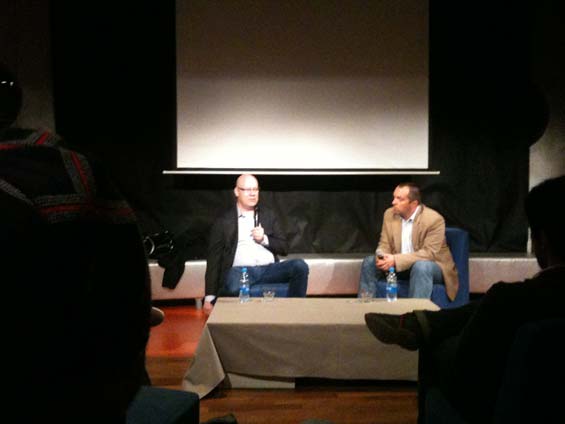Platforms rule because mashups rule
Platforms, as opposed to products and services, allow others to build on top of them. Not thinking about control and centralization, they provide the basic building blocks other can use to develop even more products and services. In the world of Web 1.0, this meant using an embedded YouTube video instead of having your own video player, but Web 2.0 has been heavily defined by ecosystems of services built around other services. With APIs these platforms provide, developing high-level mashups has never been easier from the technical point of view, and this type of architecture benefits everybody. The platform vendor gets additional developers that extend and market it's service, while the satellite mashup gets the distribution channels, users and data they need to get somewhere faster. A modern synergy packed symbiosis.

Oren Michels, CEO of Mashery, which provides API as a service, talking for Silicon Gardens in Kiberpipa
The technology platforms
Today, pretty much all of the technology market leaders are platforms. Google allows various levels of use of it's services, from embedding things to using different APIs. Facebook's games and other apps ecosystem is huge, with providers such as Zynga already gone public. Twitter and it's massive amounts of tweets generated in real-time produced the Twitterverse - an array of fascinating high-level services. Foursquare, a geo-location network allowed other interesting concepts, such as augmented reality and games, on top of its service. Amazon offers you to build your own store, and Apple's and Android's mobile app stores are hosting hundreds of thousands of apps developers can build, deploy and distribute in short amounts of time. Salesforce offers a platform for enterprise IT, WordPress for writing and blogging tools. I could go on, but you get the picture. Platforms are the future, because they evolve collaboratively, with thousands, if not millions of people co-creating them.

A massive Salesforce conference in San Francisco, which I've visited on my Silicon Valley trip (thanks Davorin!)
The real-life platforms
Not only in software and technology, platforms in real-life are also becoming more widespread. The whole Apple iPad/iPhone gadgets ecosystem is one of the most obvious cases, where various providers offer sound systems, dongles, add-ons and other accessories that upgrade and make the original item even more appealing. Nespresso and Dolce Gusto are another interesting products. Nestlé provides the platform - the small coffee pads, which they are pushing to the market, while different manufacturers make coffee machines and other complementary products. The platform becomes more useful because of its satellites, which make the platform even more successful, turning this relationship into a virtuous circle.

Coffee machines by various vendors for Nestlé Dolce Gusto
So what should I do?
Firstly, you should embrace this way of thinking and understand what's happening. Platforms have been around since the beginning of software, even though you maybe haven't thought about them in such a way. Computer architectures, Operating systems, Programming languages and Development environments are all platforms, on a more basic level - but they provide the foundation which others can build on top of. Other platforms are build atop of these and others atop of those. Platforms are everywhere, and with every new level, they are less technically, and more conceptually oriented. Think about where you fit in.
Next, find a platform that suits what you are trying to do. Personally, against many odds, I believe more in Twitter than I do in Facebook, since Facebook is trying to keep as much as possible inside its service, while Twitter acts distributed. One of our projects is Twenity, a game we've developed around Twitter influence measuring.
If you're feeling lucky, you might want to become a platform on your own. While this may be almost impossible to do, it's something I wish I will have the chance to do someday. Neolab already has its own development framework, and if we do manage to make enough surplus or find an investor that will take us down this road, I'll be the first one in line. That is, if we don't decide to join an established platform and rather build on top of that.
Things have changed. The future (of software) is in platforms. Are you already a part of the show?